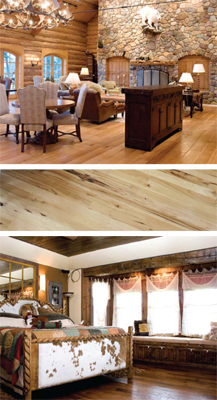Buying Locally Benefits Shoppers and the Community
The owner of Buckeye Hardwood & Lumber Company explains how everyone benefits from buying locally.

Why should a consumer purchase from a local business? Hank Adams of Buckeye Hardwood & Lumber Company in Arlee, Montana is more than a little familiar with this question. “We hear it all the time: I can get flooring or molding at a box store or discount center for less money, so why should I buy from you?” conveys Adams, owner of Buckeye Hardwoods, a Montana owned and operated business. He says the answer is simple. “Our response is straightforward. We’re local, and our money stays in the local economy. We are here to assist you through your entire process of selection and installation, and we remain here after your project is complete. We know where your product comes from and that it has been cared for properly from the forest to your home. Lastly, like many small local businesses, we believe first and foremost in purchasing and producing quality products, as well as providing excellent service while offering competitive pricing.” With the struggling economy and much tighter budgets, it is easy to justify purchasing a lower priced item from a box store, discount center or online store. However, there are more reasons to keep your purchase local. “There are so many reasons to choose a local business, like Buckeye Hardwoods, over a business where you are just another number. At our business you are a person, not a number,” explains Adams.
Dollars Spent Locally are Spent Again Locally
Experts say that from the perspective of the local economy, buying locally is win-win and a great way to boost a lagging economy. Economic research has suggested that money spent in a local economy generally stays in that local economy at least twice as long as money spent at nationalized chains and discount centers. Hank Adams is a firm believer that this is true. “When a consumer makes a purchase through Buckeye Hardwoods, several things happen that boost the local economy. First, our business pays taxes to support the community infrastructure that we all rely upon. Our business employs fifteen people that live in our community, pay taxes and make local purchases. Most of our employees deposit their paychecks into locally owned banks, eat at locally owned restaurants and shop at local businesses,” says Adams. “We also work directly with local contractors who also pay local taxes and employ local residents so the dollars reverberate with them, as well. It is easy to see that the money stays in the western Montana region longer than if it goes to an online store or an out-of-state discount center.”
Knowledge and Expertise Included in Purchase Price
Another advantage to a locally owned business is that owners and employees have an expertise and a passion for their products that is not found in large box stores. Small businesses will assist and educate a consumer and help the consumer gravitate towards the product that fits best. “Our goal is not to get you into the most expensive product or the least expensive product. Our goal at Buckeye is to find out what your needs are, what your budget is and get you into the right product. Take flooring, for example. We go through a series of questions with a customer, including where the flooring is going, the style of the house, the heating source, and then we can lead customers to the options that will best suit their needs,” explains Adams. “Our end goal is to have customers that are happy after our product is installed and in use, not just when they walk out of our door.”
Responsible Purchasing Decisions
Locally owned businesses are directly responsible to customers for purchasing the products they carry. Decisions on what and where to purchase are made on a local level instead of the national level. This can be especially important for the new “green” consumer, as local business owners can be pickier about where products come from and how they are manufactured and processed. As an example, Hank Adams is extremely selective about where Buckeye Hardwoods purchases products. “We know our suppliers. I have personally been to most of our vendors’ facilities and our vendors have been to our facilities. If there is a problem, I can go directly to the owner and get it resolved. The same is true for you as a consumer. If you buy from us and for some reason there is a problem, you can come directly to me and we’ll get it worked out,” he explains “We also know where our products are coming from. American hardwoods are what we consider the original green product and we’re proud of the fact that we know it was harvested responsibly. We know the people cutting the trees and milling the lumber and we have seen their facilities. We know they aren’t using child labor or unknown glues and chemicals in their processing. We also make sure the wood is properly dried and stored from start to finish. In short, we know the product,” Adams emphasizes. One example at Buckeye Hardwoods is Allegheny Mountain Hardwood Flooring. It has been in the lumber business for three generations and it was one of the first few hundred companies to become FSC certified. Another supplier, Sheoga Hardwood Flooring and Paneling, is Amish-owned and thus uses less electricity and energy during their cutting and manufacturing process than most facilities.
Emphasis on Quality
Knowing the source of materials has other major benefits. Identifying quality is a priority and local merchants are more likely to stand behind the quality of their products. “Quality is critical. Choosing quality hardwoods for flooring or molding can be complicated, as an example of Northern Appalachian hardwoods versus Southern Appalachian hardwoods demonstrates. Hardwood trees grown in the south grow faster because of the longer growing season and therefore, do not have as tight of a grain as hardwoods trees grown in the northerly climates. The same species can vary greatly in density and color, so you have to be selective about what region you purchase from,” Adams explains. “We like to make sure our customers know quality is the foundation our products. Likely when they compare our pricing to box stores, they are really comparing apples to oranges—we do not offer the same products.” There’s a movement across the nation that agrees with Hank Adams that buying local products from local sources is just good, sustainable business. “When I make a purchase, I really try to go to a local business. I like knowing that I am a person, not a number and that the owner of a business is going to stand behind his or her product. The same goes for our customers,” says Adams. “It just makes sense.”
|
[bannergarden id=”7″] |

